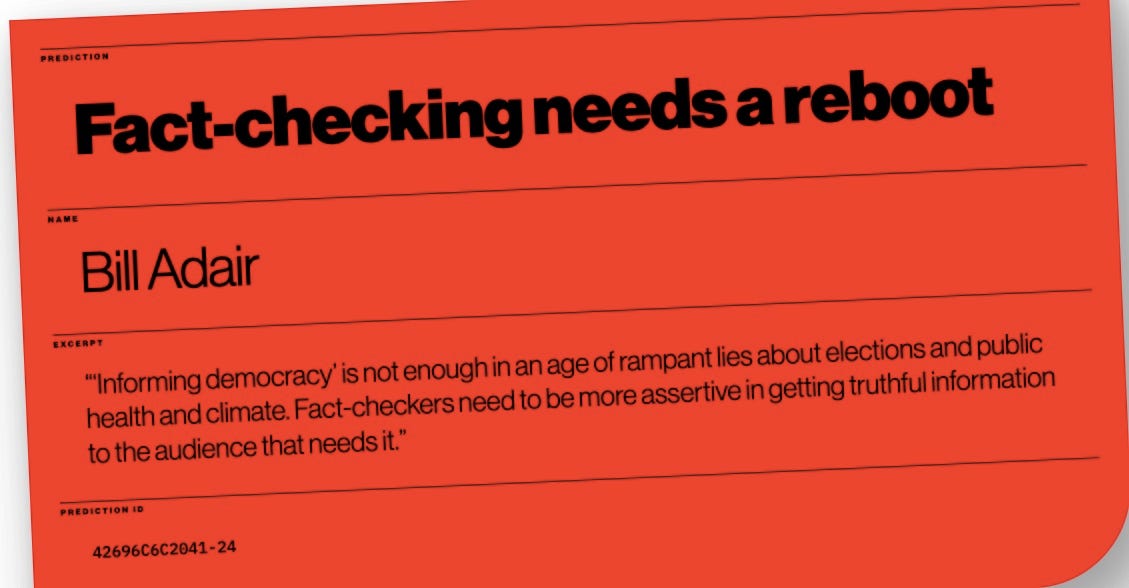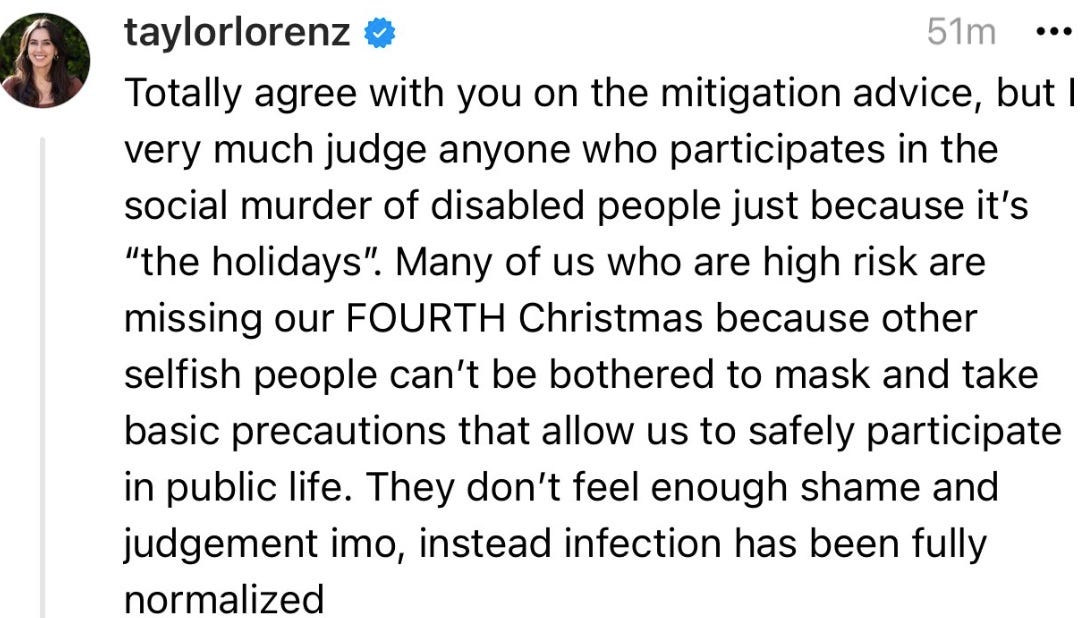Still Here
As we say goodbye to 2023 and get started with 2024, a look at the media bad practices that will never go away
January 30, 2024
Dateline: The week Taylor Swift is going to dominate the cultural conversation even more than usual
Watching this week…
— Hunter Biden laptop selective memory
— “Threats” and “information hostage-taking”
— Fact-checking fetish will get worse
— Stelter, Halperin, TheHill highlights
— Great Moments in Taylor Lorenz Journalism
As we begin the 2024 cycle, more evidence the media will never get over their 2020 Ls
2024 promises to be a truly chaotic and bizarre year — as I lay out through several examples below. But while it will be unique, there are more signs than ever it will be a continuation of what has come before. The existence of Donald Trump in the 2024 election cycle promises that whatever hope for a return to the normal, boring old biases of the recent past has evaporated — the new Trump Era of journalism is here to stay, at least for the duration of this year.
As someone who covers the press, it will provide endless fodder for Fourth Watch. As someone who hoped the Acela Media would practice some introspection and learn from its mistakes, re-establishing some degree of trust with an audience that has turned against it in record numbers — I’m going to be disappointed.
Let’s take one moment of an interview last month as an example of what’s to come — when Jake Tapper sat down with GOP senator and former best-selling author J.D. Vance. In this brief clip from the interview posted on CNN’s site with the title “Jake Tapper presses GOP Senator on future of democracy under Trump,” you get a nice range of all the worst habits on display.
First, a Liz Cheney clip. Tapper’s question out of the soundbite: “Do you really have no concerns that Donald Trump might try to abuse his power if re-elected?” Vance pushes back that the media and Cheney want to make the 2024 election all about 2020.
Next clip from Tapper — Kash Patel on Steve Bannon’s podcast saying “we’re going to come after” the media who lied. Tapper just points to Vance, who begins an answer referencing the “collusion” between government agencies and the media when it comes to the Hunter Biden laptop story. As I’ve written about here — it was the epitome of the elite censorship collusion racket between tech platforms, the government, and the media.
“It was out there,” Tapper responds, claiming it was suppressed for “like a day on Twitter.” This is of course false, as I lay out in the prologue of my book “Uncovered.” Yes, you could not share the story from the New York Post for a day, but for days and weeks after you had media outlets spinning the story as likely Russian disinformation.
And then came this Tapper defense. “As somebody that tried to see the laptop, Rudy Giuliani wouldn’t let us see the laptop,” he said. “So we weren’t able to report on it because he wanted us to just go by his word.”
This is ridiculous spin. The idea that CNN wouldn’t report on a story unless it has personally viewed the source material is patently absurd. Think about all the stories during the Trump Era CNN reported on without viewing the material themselves — citing the New York Times or the Washington Post on some Russiagate nonsense or Mueller report leak, much of which turned out to be false. It happens all the time, and does to this day. “Special counsel might use data from a phone Trump used on January 6 in election interference trial,” a CNN headline read last month. Did they simply go on the word of Jack Smith, or did they see the data?
Remember that Jake Tapper himself was one of the reporters totally fine putting the details of the flimsy-even-at-the-time-and-now-debunked-entirely Steele dossier out into the world in 2017. But when it came to the Hunter Biden laptop in 2020? It was a “dubious” story by the New York Post, according to CNN. Instead, “US authorities investigating if recently published emails are tied to Russian disinformation effort targeting Biden,” said the six-bylined piece about the story.
It’s pure spin, on one of the biggest collective media Ls of the decade. And it doesn’t bode well for future coverage to watch him hold firm and not at least concede it was woefully covered at the time.
Now, I should just say — this is nothing personal toward Jake Tapper, who does some great work on his CNN show, particularly his ongoing coverage of Israel, including as recently as last week. This is just a microcosm of the larger corporate media’s resistance to introspection. Their ongoing Trump addiction. And the latest sign that we’re going to replay all the worst instincts of a press that went far outside the guardrails of what was once acceptable journalism to meet a perceived moment fighting an existential threat to “democracy.”
Here we go again — these bad habits are still here.
Dissecting the Colorado “threats,” and a perfect example of information hostage-taking
One concept I laid out in “Uncovered” last year was the “information hostage-taking” that the press can do when certain aspects of a story are simply not compatible with the narrative it would like to push out. Consumers are more busy than ever, and have more choices than ever before — so if they glance at a story and make an assumption that the media would like them to take away from the piece, that’s not entirely accurate, it’s a fairly easy proposition.
And in a hyper-charged 2024 election year, this will be a mainstay of what we’ll be faced with. Did you hear about the “threats” against the Colorado justices that the FBI was looking into — and of course, was a result of Donald Trump? Here’s NBC News’ framing of it last month:
What threats are we talking about exactly? Well NBC doesn’t say. But as a CNN segment on the same topic makes clear, there… weren’t any “specific threats” against the justices. Instead, there was just “general discussion among extremists” that the FBI was looking into.
The FBI is looking into… something… though, from the dangerous potential domestic terrorists — that are half the country. Be afraid!
Which brings us to this month, just after the new year. We saw a run of stories from NBC News, from CNN, from all sorts of national media outlets about the “armed man” who “broke into the Colorado Supreme Court” and “opened fire.” Perhaps you heard about it. And you’d be forgiven if you, like many people on X, assumed it was related to these “threats” from Trump supporters. You’d be hard-pressed to find a single national media source that followed up on what actually happened — which we learned from the Denver Post a week or so later. Brandon Olsen had smoked meth and taken fentanyl pills, and reported hallucinating during the incident. The location was completely “random,” according to the police. His ex-wife said he had a mental breakdown, drove up from Arizona in the hopes of seeing his kids.
There certainly was nothing related to any real or perceived Trump-caused threats. But you might feel like there was. It was just another example of information hostage-taking — and a corporate press that reports a story in the most surface way possible, almost inviting a reaction that blurs the truth just enough to keep the narrative alive.
Stelter on Tucker (and CNN), and Halperin on seeing Trump coming (from the MSNBC set and beyond)
The past two guests on The Fourth Watch Podcast provided varying perspectives on politics and the media — as former regular presences on CNN and MSNBC.
I talked to Brian Stelter when his latest book came out, about a variety of topics — including his long and…complicated… relationship with former Fox News star Tucker Carlson. “I probably shouldn’t say this, but I was a big fan of Tucker Carlson,” he told me, before getting into the full backstory. We also discussed his thoughts about the Chris Licht Era of CNN, and whether Licht had the right idea on how to fix the network (“big picture, yes,” Stelter told me), and got personal about being a dad, and losing his own father as a teenager.
I also talked with Mark Halperin, longtime political documenter — in mega best-selling books, on MSNBC sets, on the campaign trail. He saw Donald Trump coming in 2016 better than most — what does he think about how that relates to 2024 now? We got into it all… including what would become of “Morning Joe.” (“Go ask Gene Robinson why he was yukking it up with Trump on Morning Joe after Trump was the leader of the birther movement...,” he told me.) We also talked about his book “Game Change,” and why that 2008 election was so compelling. Find more about what he’s doing now here by becoming a subscriber.
More Fourth Watch Podcasts are coming next month — subscribe on Apple, on Spotify, or wherever you get your podcasts.
2024 is going to be a year “fact-checking” becomes even more annoying and self-defeating
Another lamentable remnant from the Trump Era that will make a major resurgence in 2024 is, as I describe in “Uncovered,” the “fact-checking fetish.”
Last month Neiman Lab published predictions for 2024, featuring dozens of journalists sharing their takes. Some I support — like CNN’s Andrew Kaczynski’s thoughts on the return of the homepage, and my former CNN colleague Meredith Artley on the need for media outlets to actually listen to their readers and viewers. Some were really bad — like Washington Post’s Phillip Bump acting like he’s a war correspondent, and CNN’s JV media guy doing his usual embarrassing schtick.
But nothing is as bad as Bill Adair’s screed, the journalism professor who founded the site “Politifact” and perhaps more than anyone is responsible for the warped focus on politicized and partisan “fact-checking.” Bill isn’t done — he wants a “reboot”:
What does that even mean? “In 2024, they will dream up new ways of getting the facts to the people who need them,” he predicts, or rather hopes. “Fact-checkers will be bold and think more like marketers trying to push content rather than publishers waiting for the audience to come to a website. They will experiment with new forms that target the people who are misinformed and push the content directly to them.”
Fact-checkers will think more like… marketers. How gross. Listen, all you idiots who aren’t listening to our partisan fact-checks — we’re not getting through to you the usual way, so we’re going to have to market the shit out of you, and “target” you “directly” now. Maybe they’ll show up at your house and yell at you!
Fact-checking is a scourge on the journalism industry, that exists solely because the corporate media has abandoned all trust in its own audience. And if Bill is right — and I fear he is — in 2024 it will only get worse.
The 2024 election cycle media excitement is going to take place in the courtroom instead
Well this 2024 election seems to be just about all wrapped up, doesn’t it? Sure, anything can happen with two old nominees that are fairly unpopular even within their own parties. There’s also the possibility of a third party nominee making waves (or, perhaps, four “third party nominees”). But the typical ratings and clicks the media enjoys from an election year are, at least so far, not materializing.
But 2024 will instead be the “Court TV” election — where the excitement will come from the Trump trials, and the Hunter Biden trials, and the Supreme Court’s crucial election decisions. I dug into this anomaly in my latest column for TheHill, where I write weekly.
Some past topics have included why Iowa doesn’t really matter, why the 2016 Al Smith Dinner is so important to understanding our political moment, and how solid journalism brought down Harvard’s president Claudine Gay.
As the Fourth Watch newsletter gears start working again, I’ll surface my latest work over at TheHill here as well.
WATCH IT… Like a palate cleanser as we begin what will be a ridiculous, crazy, heavy 2024, here are two videos that will likely make you laugh. The final Saturday Night Live of 2023 included a now-regular segment where the two hosts of Weekend Update force each other to read offensive, uncomfortable jokes — it may be the funniest thing SNL has done all season. And here’s why Pat McAfee is the most authentic, and hilarious, force in sports media today.
HEAR IT… This was awhile ago, but the All-In Podcast’s lengthy interview with Jared Kushner was one of the best long-form conversations about the realities and stark challenges of the current state of the Middle East, post-October 7. Kushner is clearly knowledgeable about what he speaks, but unlike close to everyone opining on the issue these days, he seems genuinely objective about the work he and others did in the Trump administration to try to move very slowly toward a more peaceful region.
READ IT… It’s a horrifying and difficult read, but a necessary one. The Free Press founder Bari Weiss interviewed surviving family members of the young twins you may have heard about after the October 7 terror attack. The aunt and uncle now raising these twins go into excruciating detail, and tell a story that is both depressing, and hopeful. Or there’s this, with quite a compelling headline: “How Jon Stewart Ruined America,” from Alexander Nazaryan in Compact Magazine.
QUICK HITS
It’s getting rough out there in the media world in 2024 — the Los Angeles Times just laid off 23% of its staff, or more than 100 journalists.
Over at Business Insider it was 8% cuts, or about 70 people (10% were laid off last year too).
Sports Illustrated, which is one of the longest running magazines, may be just shutting down entirely pending a billionaire standoff.
Meanwhile Mehdi Hasan, one of the more controversial on-air talent at MSNBC, has officially left the network after losing his show.
Why is this all happening? Well, a lot of reasons, but one good companion is the massive, must-read James Bennet Economist piece from last month.
Meanwhile it seems Jeff Zucker may be heading back into the media business, across the pond.
Paul Farhi, who took a Washington Post buyout, writes for The Atlantic about how Fox News isn’t a “kingmaker” because it couldn’t make Ron DeSantis happen (doesn’t that say more about the GOP electorate compared to the sway-able Dems?).
And for something a little out in left field, I enjoyed this NYT deep dive into cartoons that have good dads in it, like Bluey (although didn’t love all the conclusions).
⏪ REWIND // FAST FORWARD: John Fetterman Edition ⏩
⏪ Last February, I wrote pretty critically of how the press covered for Senator John Fetterman during the campaign, only to reveal the true scope of his ailment, and inability to do the job, after he was elected.
⏩ Well close to a year later, I was either wrong about Fetterman, or his recent public positions during better performances in interviews like this with Politico (written, to be fair) are more in line with my own. Either way, it’s a transformation worth watching, and covering.
MORE TK…
I still think climate change remains one of the most under-covered media stories — we get lots of surface coverage in the press about the issues, but very little substantive reporting. Like this from CNN last month, for example, which highlighted a “surprising phenomenon” in the Himalayas that showed warmer temperatures suddenly creating more cold wind and offsetting the affect of a rising overall temperature, and thus slowing the effects of climate change. So often people speak with such authority about what they know so little about. Let’s find out more…
GREAT MOMENTS IN JOURNALISM
Welcoming 2024 with a classic from Taylor Lorenz sent just before Christmas, as discovered by ThePostMillennial. “The social murder of disabled people” — Happy New Year!
Thanks for reading. I know it’s been awhile since this newsletter was sent — a combination of factors. I’ll be back on a semi-regular schedule in the new year, with some other elements,
For paying subscribers, the two month pause is now over. You’ll receive your first paid-only piece of content next week. More to come…
—Steve








You write, Steve, that the media has to reform itself. I don't think you realize that the media, as we know it ,is dead. Dead. Dead.
Wow, you really outdid yourself with lots of news and other great reading suggestions